七年级下Unit 2总复习
- 格式:doc
- 大小:56.00 KB
- 文档页数:4
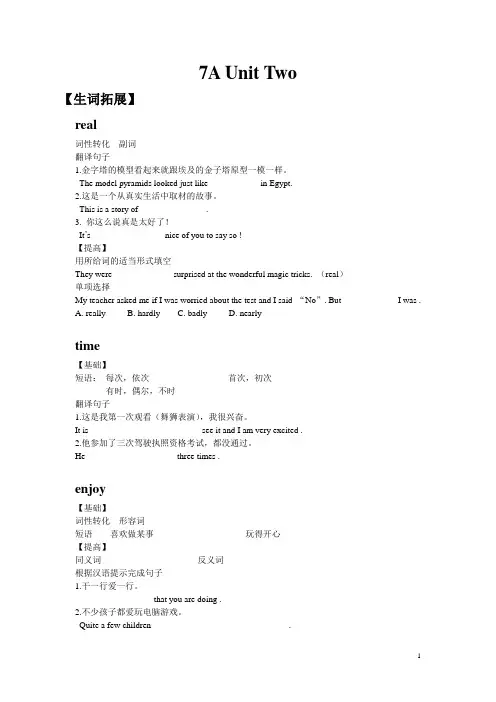
7A Unit Two【生词拓展】real词性转化副词_______________翻译句子1.金字塔的模型看起来就跟埃及的金子塔原型一模一样。
The model pyramids looked just like ___________ in Egypt.2.这是一个从真实生活中取材的故事。
This is a story of _______________.3. 你这么说真是太好了!It’s ________________ nice of you to say so !【提高】用所给词的适当形式填空They were _____________ surprised at the wonderful magic tricks. (real)单项选择My teacher asked me if I was worried about the test and I said “No”. But ____________ I was .A. reallyB. hardlyC. badlyD. nearlytime【基础】短语:每次,依次_________________ 首次,初次_________________有时,偶尔,不时__________________翻译句子1.这是我第一次观看(舞狮表演),我很兴奋。
It is _________________________ see it and I am very excited .2.他参加了三次驾驶执照资格考试,都没通过。
He ____________________ three times .enjoy【基础】词性转化形容词____________________短语喜欢做某事___________________ 玩得开心_____________________【提高】同义词____________________ 反义词____________________根据汉语提示完成句子1.干一行爱一行。
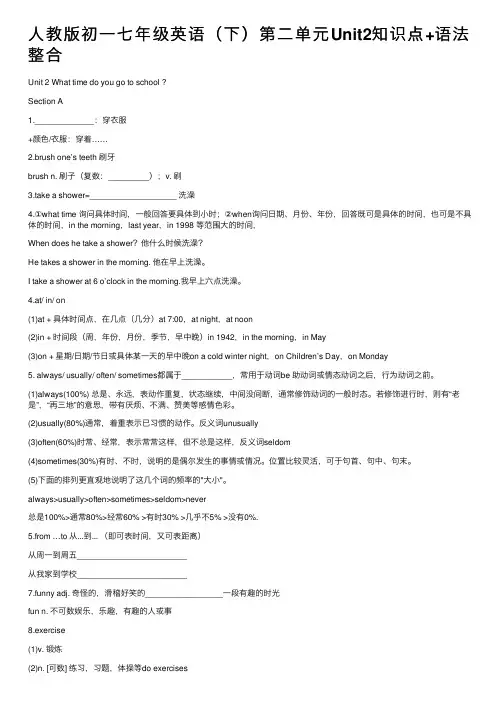
⼈教版初⼀七年级英语(下)第⼆单元Unit2知识点+语法整合Unit 2 What time do you go to school ?Section A1._____________:穿⾐服+颜⾊/⾐服:穿着……2.brush one’s teeth 刷⽛brush n. 刷⼦(复数:_________);v. 刷3.take a shower=___________________ 洗澡4.①what time 询问具体时间,⼀般回答要具体到⼩时;②when询问⽇期、⽉份、年份,回答既可是具体的时间,也可是不具体的时间,in the morning,last year,in 1998 等范围⼤的时间,When does he take a shower?他什么时候洗澡?He takes a shower in the morning. 他在早上洗澡。
I take a shower at 6 o’clock in the morning.我早上六点洗澡。
4.at/ in/ on(1)at + 具体时间点,在⼏点(⼏分)at 7:00,at night,at noon(2)in + 时间段(周,年份,⽉份,季节,早中晚)in 1942,in the morning,in May(3)on + 星期/⽇期/节⽇或具体某⼀天的早中晚on a cold winter night,on Children’s Day,on Monday5. always/ usually/ often/ sometimes都属于___________,常⽤于动词be 助动词或情态动词之后,⾏为动词之前。
(1)always(100%) 总是、永远,表动作重复,状态继续,中间没间断,通常修饰动词的⼀般时态。
若修饰进⾏时,则有“⽼是”,“再三地”的意思,带有厌烦、不满、赞美等感情⾊彩。
(2)usually(80%)通常,着重表⽰已习惯的动作。
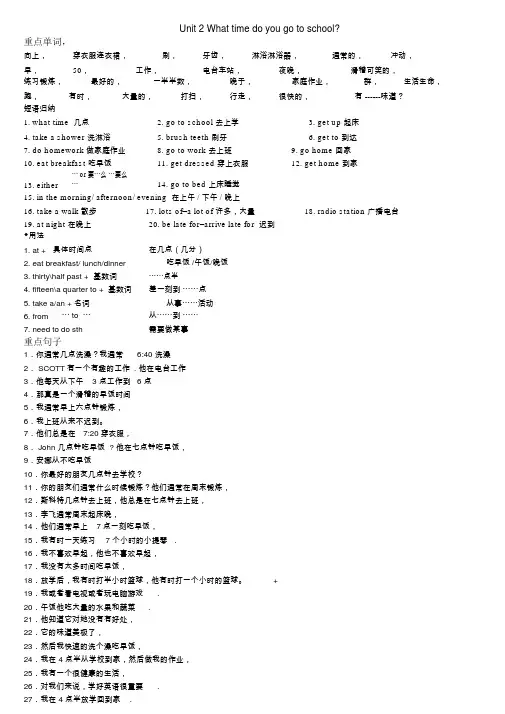
Unit 2 What time do you go to school?重点单词,向上,穿衣服连衣裙,刷,牙齿,淋浴淋浴器,通常的,冲动,早,50,工作,电台车站,夜晚,滑稽可笑的,练习锻炼,最好的,一半半数,晚于,家庭作业,群,生活生命,跑,有时,大量的,打扫,行走,很快的,有 ------味道?短语归纳1. what time 几点2. go to school 去上学3. get up 起床4. take a shower 洗淋浴5. brush teeth 刷牙6. get to 到达7. do homework 做家庭作业8. go to work 去上班9. go home 回家10. eat breakfast 吃早饭11. get dressed 穿上衣服12. get home 到家13. either ⋯ or要⋯么⋯要么⋯14. go to bed 上床睡觉15. in the morning/ afternoon/ evening 在上午 / 下午 / 晚上16. take a walk 散步17. lots of=a lot of 许多,大量18. radio station 广播电台19. at night 在晚上20. be late for=arrive late for迟到◆用法1. at +具体时间点在几点(几分)2. eat breakfast/ lunch/dinner吃早饭 /午饭/晚饭3. thirty\half past +基数词⋯⋯点半4. fifteen\a quarter to + 基数词差一刻到⋯⋯点5. take a/an + 名词从事⋯⋯活动6. from⋯ to ⋯从⋯⋯到⋯⋯7. need to do sth需要做某事重点句子1.你通常几点洗澡?我通常6:40 洗澡2. SCOTT有一个有趣的工作. 他在电台工作3.他每天从下午 3 点工作到 6 点4.那真是一个滑稽的早饭时间5.我通常早上六点钟锻炼,6.我上班从来不迟到。

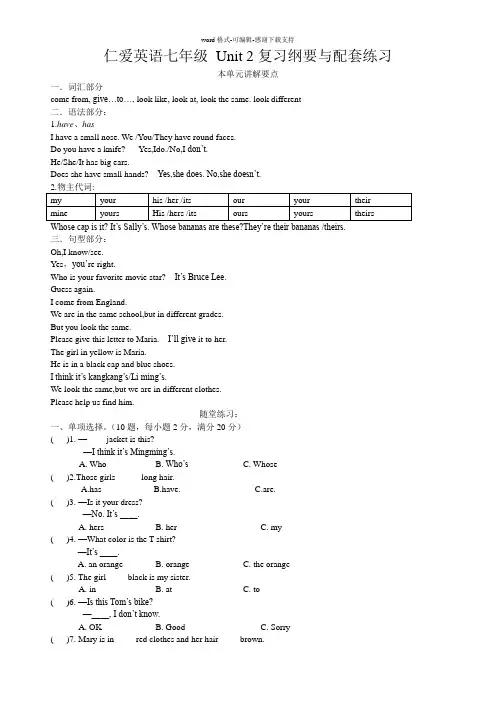
仁爱英语七年级Unit 2复习纲要与配套练习本单元讲解要点一.词汇部分come from, give…to…, look like, look at, look the same. look different二.语法部分:1.have、hasI have a small nose. We /You/They have round faces.Do you have a knife? Yes,Ido./No,I don’t.He/She/It has big ears.Does she have small hands? Yes,she does. No,she doesn’t.Whose cap is it? It’s Sally’s. Whose bananas are these?They’re their bananas /theirs.三.句型部分:Oh,I know/see.Yes,you’re right.Who is your favorite movie star? It’s Bruce Lee.Guess again.I come from England.We are in the same school,but in different grades.But you look the same.Please give this letter to Maria. I’ll give it to her.The girl in yellow is Maria.He is in a black cap and blue shoes.I think it’s kangkang’s/Li ming’s.We look the same,but we are in different clothes.Please help us find him.随堂练习:一、单项选择。
(10题,每小题2分,满分20分)( )1. —____ jacket is this?—I think it’s Mingming’s.A. WhoB. Who’sC. Whose( )2.Those girls _____ long hair.A.hasB.have.C.are.( )3. —Is it your dress?—No. It’s ____.A. hersB. herC. my( )4. —What color is the T-shirt?—It’s ____.A. an orangeB. orangeC. the orange( )5. The girl ____ black is my sister.A. inB. atC. to( )6. —Is this Tom’s bike?—____, I don’t know.A. OKB. GoodC. Sorry( )7. Mary is in ____ red clothes and her hair ____ brown.A. /; isB. a; areC. /; are( )8. —Do you look like your sister?—No, we ____.A. look the sameB. look differentC. look like( )9. —You are nice in this dress.—____A. It’s right.B. No, it isn’t.C. Thank you.( )10.-What does your brother look like?-She has _____nose.A.a big red B .a red big C.red big二、词汇运用。
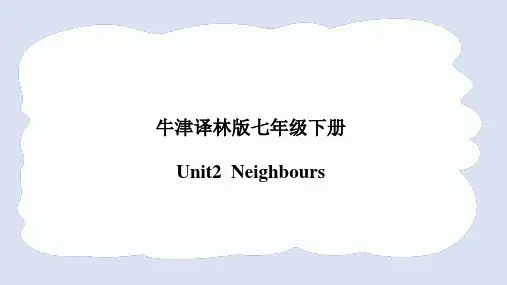
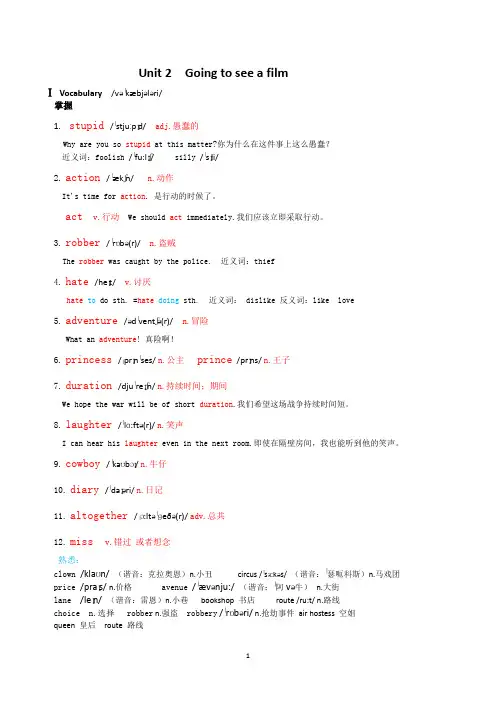
Unit 2 Going to see a filmⅠVocabulary/vəˈkæbjələri/掌握1. stupid /ˈstjuːpɪd/ adj.愚蠢的Why are you so stupid at this matter?你为什么在这件事上这么愚蠢?近义词:foolish /ˈfu:lɪʃ/ silly /ˈsɪli/2.action /ˈækʃn/ n.动作It's time for action. 是行动的时候了。
act v.行动We should act immediately.我们应该立即采取行动。
3.robber /ˈrɒbə(r)/ n.盗贼The robber was caught by the police. 近义词:thief4.hate /heɪt/ v.讨厌hate to do sth. =hate doing sth. 近义词: dislike 反义词:like love5.adventure /ədˈventʃə(r)/ n.冒险What an adventure! 真险啊!6.princess /ˌprɪnˈses/ n.公主prince/prɪns/ n.王子7.duration /djuˈreɪʃn/ n.持续时间;期间We hope the war will be of short duration.我们希望这场战争持续时间短。
ughter /ˈlɑ:ftə(r)/ n.笑声I can hear his laughter even in the next room.即使在隔壁房间,我也能听到他的笑声。
9.cowboy /ˈkaʊbɔɪ/ n.牛仔10.diary /ˈdaɪəri/ n.日记11.altogether /ˌɔ:ltəˈɡeðə(r)/ adv.总共12.miss v.错过或者想念熟悉:clown/klaʊn/ (谐音:克拉奥恩)n.小丑circus /ˈsɜ:kəs/ (谐音:ˈ瑟呃科斯)n.马戏团price /praɪs/ n.价格 avenue /ˈævənju:/ (谐音:ˈ阿və牛)n.大街lane /leɪn/ (谐音:雷恩)n.小巷bookshop 书店route /ru:t/ n.路线choice n.选择 robber n.强盗 robbery/ˈrɒbəri/ n.抢劫事件air hostess 空姐queen 皇后route 路线ⅡPhrase /freɪz/1.take a look=have a look 看一看let's take/have a look around the exhibition./ˌeksɪˈbɪʃn/ n.展览咱们看看展览吧。
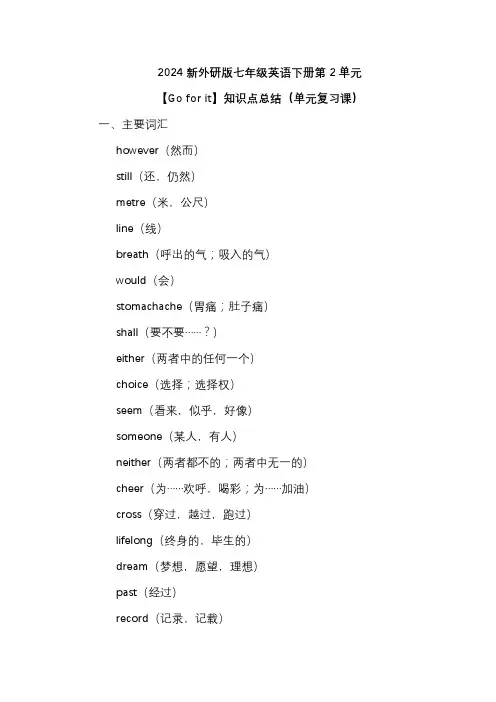
2024新外研版七年级英语下册第2单元【Go for it】知识点总结(单元复习课)一、主要词汇however(然而)still(还,仍然)metre(米,公尺)line(线)breath(呼出的气;吸入的气)would(会)stomachache(胃痛;肚子痛)shall(要不要……?)either(两者中的任何一个)choice(选择;选择权)seem(看来,似乎,好像)someone(某人,有人)neither(两者都不的;两者中无一的)cheer(为……欢呼,喝彩;为……加油)cross(穿过,越过,跑过)lifelong(终身的,毕生的)dream(梦想,愿望,理想)past(经过)record(记录,记载)none(全无,没有一点)member(成员)moment(某一时刻)if(假若,要是,如果)possible(可能的,可能做到的,可能实现的)purpose(目的,意图)raise(筹集;筹募)charity(慈善事业)encourage(鼓励,激励)teach(教)note(笔记)during(在……期间)consider(考虑,细想)both(两者,双方,两个都)as(在某一年龄段时)shark(鲨鱼)attack(袭击,殴打,破坏)nearly(几乎,差不多,将近)die(死去,死亡)competition(比赛)compare(相比较;可媲美)achievement(成绩;成就)ride(漂浮)lover(爱好者)gold(金质的)medal(奖牌;勋章)fit(健壮的,健康的)final(决赛)team(游戏或体育比赛的队)even(甚至)worse(更严重地;更厉害地)continue(继续)brave(勇敢的,无畏的)action(行为)fight(努力争取;为……斗争)score(在运动、比赛或考试中得(分))goal(进球;进球得分)victory(胜利,成功,赢)lead(带路,领路;引领)international(国际的)chance(机会)improve(改善,改进;变得更好)create(创造)wonder(想要知道)success(成功,胜利,成就)explain(解释,说明)simple(单纯的,纯粹的,完全的)same(相同的,同一个的)courage(勇气,胆量,勇敢)ahead(在前面)spirit(某一特定历史时期、地方或群体的精神,风气)last but not least(最后但同样重要的)marathon(马拉松赛跑)surf(冲(浪))sink(下沉,沉没)surfer(冲浪者)confident(有信心的,自信的)surfboard(冲浪板)二、重点短语Go for it(全力以赴,勇敢尝试)The benefits of sports(体育运动的益处)How do you like sth?(你认为……怎么样?)the origin of sports(体育的起源)Last but not least(最后但并不是不重要)Move slowly(慢慢地移动)Hold one’s breath(屏住呼吸)Make it(取得成功)Feel confident(感到自信)Have a stomachache(肚子疼)On the way(在路上)Fall behind(落后)Take a rest(休息一下)Seem fine(看起来不错)Either···or···(要不……,要不……;不是……,就是……)Neither···nor···(既不……,也不……)Both···and···(两个都……)At the age of···(在某人……岁时)With sb/sth doing(伴随着……在做……)Cross the finishing line(跨过终点线)Marathon running(马拉松跑步)Run on(继续跑)Sb’s lifelong dream(某人的终生梦想)Go past home(经过家门)Fill···with···(用……来填满……)None of···(没有一个)Family members(家庭成员)Try to stop sb(企图阻止某人)the oldest and the slowest runner(年龄最大跑的最慢的跑步者)It doesn’t matter to sb(对某人来说不重要)Have a plan to do sth(有做……的计划)If possible(如果有可能)Keep doing(继续做……)Make a choice(做出选择)Sink or swim(要么沉没,要么游泳)Attack sb(袭击某人)Give up doing(放弃做……)Win a competition(赢得比赛)Compare with sb/sth(与……相比)Ride the waves(乘风破浪)Other forms of sports(运动的其他形式)Physical activities(身体活动)According to(根据)At least(至少)Win a gold medal(赢得一个金牌)Break the record(打破纪录)Be proud of(对……骄傲)The radio station(广播站)Become fit and strong(变得强健)Join a swimming race(加入一个游泳比赛)Even worse(更糟糕的是)Hurt one’s foot(伤到某人的脚)Pay attention to doing(专注于做……)In pain(处于疼痛中)No pain, no gain(不劳无获)Continue to do(继续去做)Brave action(勇敢的行为)Encourage sb to do sth(鼓励某人去做)Lose heart(灰心丧气)Fight on(继续奋战)Score the goal(进球得分)Achieve the goal(实现目标)Lead sb to do sth(引导某人去做)Look back at(回头看……)Lose to sb(输给某人)Take every chance to do sth(抓住每次机遇去做)Wonder about sth(对……感到好奇)The key to success(成功的关键)Be known as(作为……而被熟知/出名)Be close to(靠近……)Gather courage to do sth(鼓起勇气去做……)Rise to every challenge(迎接每次挑战)Thanks to sb/sth(多亏……)The shining spirit(闪耀的精神)The comments on sth(对……的评论)Sporting spirit(运动精神)三、重点句型1. How do you like sth? 你认为……怎么样?示例:How do you like this book?2. Either…or… 要不……,要不……;不是……,就是……(用于两者选择)示例:I want to eat either an apple or an orange.3. Neither…nor… 既不……,也不……(用于两者都不)示例:Neither Tom nor Mary is at home.4. Both…and… 两个都……示例:Both my parents like to travel.5. At the age of… 在某人……岁时示例:He started playing tennis at the age of six.6. With sb/sth doing 伴随着……在做……示例:I like to listen to music with the radio playing.7. All of them held their breath. Would he make it? 他们全都屏息静气。
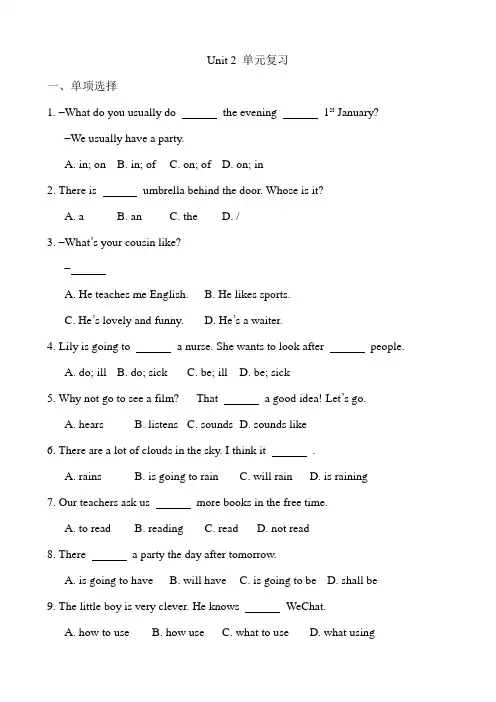
Unit 2 单元复习一、单项选择1. –What do you usually do the evening 1st January?–We usually have a party.A. in; onB. in; ofC. on; ofD. on; in2. There is umbrella behind the door. Whose is it?A. aB. anC. theD. /3. –What’s your cousin like?–A. He teaches me English.B. He likes sports.C. He’s lovely and funny.D. He’s a waiter.4. Lily is going to a nurse. She wants to look after people.A. do; illB. do; sickC. be; illD. be; sick5. Why not go to see a film? That a good idea! Let’s go.A. hearsB. listensC. soundsD. sounds like6. There are a lot of clouds in the sky. I think it .A. rainsB. is going to rainC. will rainD. is raining7. Our teachers ask us more books in the free time.A. to readB. readingC. readD. not read8. There a party the day after tomorrow.A. is going to haveB. will haveC. is going to beD. shall be9. The little boy is very clever. He knows WeChat.A. how to useB. how useC. what to useD. what using10. What does the notice , Mary?A. talkB. sayC. speakD. tell11. Can you cook eggs with tomatoes? Yes of course. do it.A. AnyoneB. SomeoneC. AnythingD. Something12. What’s wrong? My bike isn’t .A. workB. goC. workingD. using13. –Dear, go to bed before 9 o’clock.–OK. I , Mum.A. doB. don’tC. willD. won’t14. Peter often makes his sister . What a nice brother!A. feels happyB. feel happyC. feels sadD. feel sad15. Little Wilson is good at drawing. He may become a good some day.A. workerB. artistC. cookD. player二、完形填空My dearest Aunt Chen lives in the country (郊区). But she isn’t a 1 . She 2 vegetables from the farmers and sells (卖) them in town. Sometimes she can’t sell out all her vegetables, 3 she gives some to us. Aunt Chen is old and short, but she’s very 4 . She can walk 5 .Aunt Chen has no 6 . She lives with her only black dog. Every summer, I go to stay with 7 for a week or two. She is very happy and often takes me to a farm nearby. Life in the country is 8 . I can go fishing, and I can hear birds sing and sheep bleat. I can also go to play in the field with 9 children and work with the farmers. The farmers don't do farm work with animals now. They use machines todo it. 10 of them live a modern life.1. A. teacher B. doctor C. farmer D. nurse2. A. grows (种植) B. sells C. asks D. buys3. A. but B. so C. or D. because4. A. healthy B. ill C. happy D. interesting5. A. slowly B. fast C. near D. far6. A. money B. friends C. home D. children7. A. him B. her C. it D. your8. A. unhappy B. boring C. poor D. interesting9. A. another B. any other C. other D. others10. A. Both B. All C. Each D. None三、阅读理解AWelcome to our community centre!We have different clubs. It is a great place to keep fit and enjoy yourselves!1. You can see the information .A. in a comic bookB. on TVC. in a magazineD. on the community notice board2. The word “cool” means “ ” in the sentence “It is really cool!”A. wonderfulB. not hot or warmC. coldD. difficult3. You can take the dancing class at .A. 7:00 a.m.B. 3:00 p.m.C. 4:00 p.m.D. 8:00 a.m.4. Mr. Thomas is free from 6:00 a.m. to 8:00 a.m. and he can go to .A. Ball Games ClubB. Swimming ClubC. Free ClassesD. Kids Club5. Mrs. Thomas wants her 5-year-old girl to learn dancing. She should call .A. 375-4789B. 375-4753C. 375-4676D. 375-4766BDo you live with your grandparents or great-grandparents? Recently, a video called “Four Generations”has become popular online. It shows the structure of a Chinese family from young children to great-grandparents. It also shows how much Chinese people love their family.In many Chinese families, a few generations live together. This is called anextended family. Usually it is “four-two-one”—four grandparents, two grandparents and one child.This family structure has both good and bad sides. When parents are busy with work, grandparents can help take care of the children. According to The Atlantic magazine, 90% of children in Shanghai and 70% of children in Beijing grow up with the care of grandparents.But some people say grandparents love their grandchildren too much and let them eat too much. Arguments may happen among family members of different ages.Life can be both sweet and bitter. Family life is no different. But the most important thing to remember is that family is all about love.6. What is the structure of a Chinese family in the video?A. From young children to parents.B. From young children to grandparents.C. From parents to great grandparents.D. From young children to great grandparents.7. What does the video show?A. How busy Chinese people are.B. How sad Chinese people are.C. How much Chinese people love their children.D. How much Chinese people love their family.8. Who spends the most time staying with children according to The Atlantic?A. Parents.B. Grandparents.C. Great-grandparents.D. Nurses.9. Which of the following is NOT true according to the passage?A. A video called “Four Generations” has become popular online.B. “Four-two-one”—four grandparents, two grandparents and one child.C. This family structure doesn't have any bad sides.D. Life can not always be sweet.10. Which would be the best title for the passage?A. Four Generations.B. Parents and grandparents.C. Different families.D. Love from grandparents.四、填空A)根据括号中所给汉语写出单词,使句子意思完整正确。
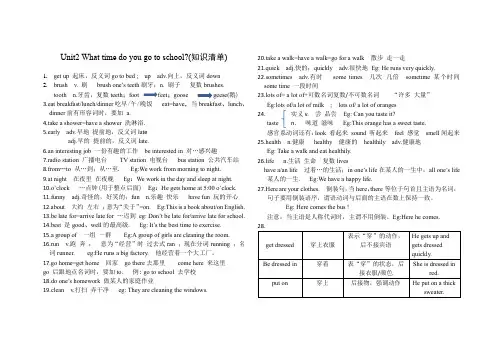
Unit2 What time do you go to school?(知识清单)1. get up 起床,反义词go to bed ; up adv.向上,反义词down2. brush v. 刷 brush one’s teeth 刷牙;n. 刷子 复数brushes.tooth n.牙齿,复数teeth ;footfeet ;goose geese(鹅) 3.eat breakfast/lunch/dinner 吃早/午/晚饭 eat=have ,当breakfast 、lunch 、dinner 前有形容词时,要加 a.4.take a shower=have a shower 洗淋浴.5.early adv.早地 提前地,反义词lat e adj.早的 提前的,反义词late.6.an interesting job 一份有趣的工作 be interested in 对…感兴趣7.radio station 广播电台 TV station 电视台 bus station 公共汽车站8.from …to 从…到;从…至. Eg:We work from morning to night.9.at night 在夜里 在夜晚 Eg :We work in the day and sleep at night. 10.o’clock …点钟(用于整点后面) Eg :He gets home at 5:00 o’clock. 11.funny adj.奇怪的,好笑的;fun n.乐趣 快乐 have fun 玩的开心 12.about 大约 左右 ;意为“关于”=on. Eg:This is a book about/on English. 13.be late for=arrive late for …迟到 eg: Don’t be late for/arrive late for school. 14.best 是good 、well 的最高级. Eg: It’s the best time to exercise. 15.a group of 一组 一群 Eg:A group of girls are cleaning the room.16.run v.跑 奔 ; 意为“经营”时 过去式ran ;现在分词running ;名词runner. eg:He runs a big factory. 他经营着一个大工厂。
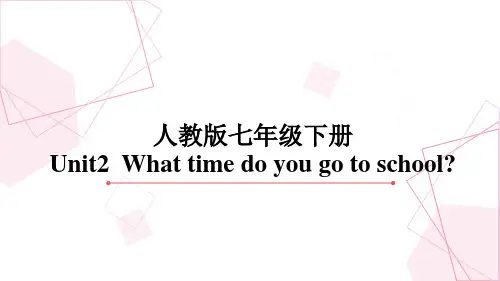
人教七年级下册英语unit2知识点总结Unit 2知识点总结Unit 2主要介绍了有关学校和课程的相关话题,包括学科名称、教室设施、课程时间和日常学习及校外活动等内容,下面我们来一一进行总结。
一、学科名称1. 英语 - English2. 数学 - Math3. 历史 - History4. 科学 - Science5. 美术 - Art6. 音乐 - Music7. 体育 - P.E.8. 计算机 - Computer Science二、教室设施1. 黑板 - blackboard2. 白板 - whiteboard3. 投影仪 - projector4. 音响 - sound system5. 地图 - map6. 水龙头 - tap7. 电视 - TV8. 电脑 - computer9. 灯 - light10. 窗户 - window三、课程时间1. 上午 - in the morning2. 下午 - in the afternoon3. 晚上 - in the evening4. 早上 - in the early morning5. 夜晚 - at night6. 每周 - every week7. 每天 - every day8. 周末 - on weekends四、日常学习1. 做作业 - do homework2. 练习 - practice3. 复习 - review4. 读书 - read books5. 写作 - write compositions6. 讨论 - have discussions7. 板书笔记 - take notes8. 教师讲解 - teacher's explanation9. 学习笔记 - study notes10. 做练习 - do exercises五、校外活动1. 课外活动 - extracurricular activities2. 运动会 - sports meeting3. 聚会 - party4. 社交活动 - social activities5. 英语角 - English corner6. 爱好小组 - hobby group7. 社团活动 - club activities8. 学校之旅 - school trip以上就是Unit 2的主要内容,希望能够帮助大家更好地学习英语,更好地了解学校和课程的相关话题。
Unit 2 What time do you usually go to school?一、词汇拓展1.brush(单三)brushes2. tooth(复数)teeth3. always (反义词)never4.early(反义词)late5. work(同义词)job6. night(反义词)day7. half(复数)halves8. run(现在分词)running9. life(复数)lives二、重点短语1.get up起床2. get dressed穿上衣服3. have/take a shower 淋浴4.brush teeth涮牙5. go to school/work 去学校/上班6. at night 在晚上7. on weekends 在周末8. on school days 在上学期间9.have(eat) breakfast /dinner吃早餐/晚餐10.do (one's) homework 做作业11. take a walk 散步12. in the morning/ afternoon/ evening 在上午/下午/晚上13. go to bed上床睡觉14. go home 回家15. eat quickly 吃得快16. play sports 做运动17. for half an hour 长达半小时18. get home 到家19. get to school 到校20. eat a good breakfast吃一顿好的早餐21. after lunch /dinner 午餐/晚餐后22. taste good 尝起来好吃23. have a very healthy life 有健康的生活24. from Monday to Friday从周一到周五25. radio station广播电台三用法集萃1.What time 几点,何时2. either…or 要么……要么,或者…..或者(做主语时,谓语就近原则)3.need to do sth 需要做某事4. be good for 对……有益/有好处5. eat…for breakfast/ lunch/dinner 早/午晚餐吃……6. lots of+可数名词复数/不可数名词许多的,大量的= a lot of…7. half past +钟点数几点半8. be late for…做……迟到9. from…to…从……到……10. have time to do sth / have time for sth. 有时间做……11. That's a funny time for…那是做……有意思的时间。
Unit 2 What time do you go to school?◆短语归纳1. what time 几点2. go to school 去上学3. get up 起床 go to bed 上床睡觉 (反义词get up )4. take a shower = have a shower 洗淋浴5. brush teeth 刷牙6. get to 到达7. do homework 做家庭作业 8. go to work 去上班 (反义词 go home ) 9. go home 回家 10. eat breakfast 吃早饭 11. get dressed 穿上衣服12. get home 到家13. either…or… 要么…要么… 14. make breakfast 做早饭15. in the morning/ afternoon/ evening 在上午/下午/晚上 16. take a walk 散步17. lots of=a lot of 许多,大量 18. radio station 广播电台 19. at night 在晚上20. be late for=arrive late for 迟到 21.make a shower schedule 做一个洗澡的安排22. have breakfast/dinner/lunch 吃早晚午饭 23.get to work 到达工作岗位24.practice guitar 练吉它 25.leave home 离家 26.go to class 上课27.take the Number 17 bus to the Hotel 乘17路公共汽车去旅馆◆用法集萃 ◆典句必背 1. What time do you usually get up? I usually get up at six thirty. 2. That’s a funny time for breakfast. in the evening.4. In the evening, I either watch TV or play computer games.5. At twelve, she eats lots of fruit and vegetables for lunch..6. She knows it’s not good for her, but it tastes good.7. Here are your clothes.◆语法1、英语时间的表达(1) 整点时间可表示为“钟点数+o’clock”或直接读钟点数,省去o’clock 。
新目标七年级下Unit 2 知识点归纳与复习单元知识清单一、重点单词:1. libr r 图书馆2. rest rant 餐馆3. superm ket 超市4. str t 街道5. p k 公园6. c nt 中心7. br ge 桥8. n 在……附近9. acr 横过10. n xt 贴近11. betw n 在两者之间12. fr nt 前面13. t n 转弯14. l ft 左边15. r t 右边16. cl n 清洁的17. qu t 宁静的18. d ty 肮脏的19. h se 房子20. welc m 欢迎21. g den 花园22. enj 欣赏23. w k 散步24. thr 穿过25. begin 开始26. t 旅行27. v s t 参观28. pl ce 地方29. h gry 饥饿的30. a ive 到达31. w 路线32. t ke 乘, 坐33. t x 出租车34. airp t 飞机场35. p ss 通过36. h pe 希望二、必会短语1. post 邮局2. phone 投币式公用电话3. in of 在……前面4. on 在右边5. take 散步6. fun 玩得开心7. turn 向左转8. across 在……对面9. take 坐出租车10. have a 旅途愉快三、应知语法和句式:1. 表示在某地有某物用there be。
如:在这附近有一家银行。
a bank near here.2. There de 的一般问句是将be放到there的前面。
如:有一个超市吗?a supermarket?肯定回答是:Y es, .否定回答是:No, .3. 本课学习的两种问路方式:一种是:用Is there …? 如:在这附近有公用电话吗?a pay phone near here?另一种是:用Where is the …? 如:图书馆在哪?the library?4. welcome to …表示欢迎到某地。
矿产资源开发利用方案编写内容要求及审查大纲
矿产资源开发利用方案编写内容要求及《矿产资源开发利用方案》审查大纲一、概述
㈠矿区位置、隶属关系和企业性质。
如为改扩建矿山, 应说明矿山现状、
特点及存在的主要问题。
㈡编制依据
(1简述项目前期工作进展情况及与有关方面对项目的意向性协议情况。
(2 列出开发利用方案编制所依据的主要基础性资料的名称。
如经储量管理部门认定的矿区地质勘探报告、选矿试验报告、加工利用试验报告、工程地质初评资料、矿区水文资料和供水资料等。
对改、扩建矿山应有生产实际资料, 如矿山总平面现状图、矿床开拓系统图、采场现状图和主要采选设备清单等。
二、矿产品需求现状和预测
㈠该矿产在国内需求情况和市场供应情况
1、矿产品现状及加工利用趋向。
2、国内近、远期的需求量及主要销向预测。
㈡产品价格分析
1、国内矿产品价格现状。
2、矿产品价格稳定性及变化趋势。
三、矿产资源概况
㈠矿区总体概况
1、矿区总体规划情况。
2、矿区矿产资源概况。
3、该设计与矿区总体开发的关系。
㈡该设计项目的资源概况
1、矿床地质及构造特征。
2、矿床开采技术条件及水文地质条件。